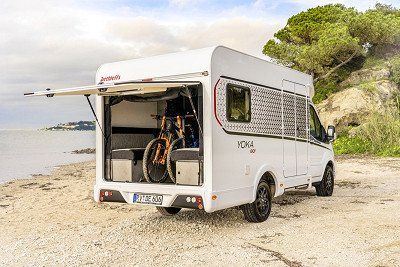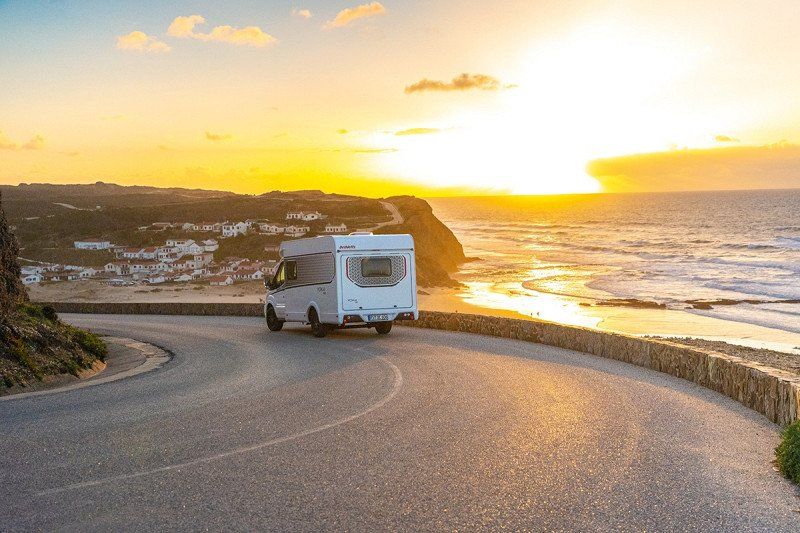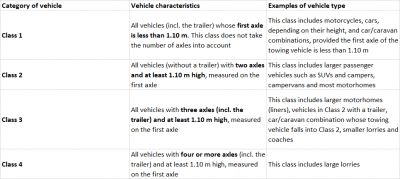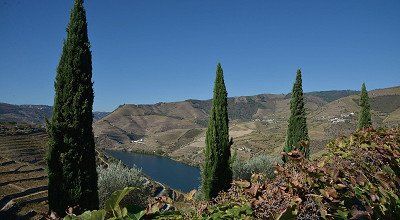Last update: January 20, 2026
Contents
Entry into Portugal
Speed limits and fines for motorhomes and caravans in Portugal
Toll roads in Portugal
Petrol stations – opening times and payment methods in Portugal
General traffic rules in Portugal
Motorhome rental in Portugal
Important telephone numbers for holidaymakers in Portugal

Entry into Portugal
Entry requirements for EU citizens
When visiting as tourists, EU citizens need a (temporary) passport or a (temporary) ID card or a child passport.
Entry requirements for British citizens
When visiting as tourists, British citizens need a (child) passport that has at least three months of validity and is not older than ten years when entering the country. You will not need a visa if you stay up to 90 days every 180-day period. Stays of more than 90 days will require a visa.
Minors (under 18 years of age) travelling with you, e.g. friends of your children, should carry a declaration of consent from their parents or legal guardian.
Entry requirements for pets
Dogs, cats and ferrets need an EU pet passport, microchip identification and a valid rabies vaccination that is at least 21 days old. Animals younger than 15 weeks are not allowed to enter Portugal. You can travel with up to five pets. If you exceed this amount, you will have to observe the commercial import regulations. You should always carry a leash with you as it is mandatory in many places.
Speed limits and fines for motorhomes and caravans in Portugal
Speed limits in Portugal
Toll roads in Portugal
Most motorways in Portugal are toll roads. Payment is made either in the traditional way at the toll stations or via an electronic payment system. Since 2011, only electronic toll payments are accepted on specific routes. These routes are marked with blue signs saying "Electronic Toll Only". This means that you can only pay online or via toll box to use these motorways, which include certain sections of the A4, A17, A19, A25, A28, A29, A33, A41, A42. However, the toll obligation was lifted on some motorways on 1 January 2025. This applies to certain sections of the A4, A13, A25 and A28 as well as the A13-1, A22, A23 and A24 motorways in their entirety.
You have to register in advance to pay the toll electronically. The easiest way to do this is to use a toll box. Alternatively, when entering the country, head for one of the so called Welcome Points at the border to register your vehicle for the tolling system. You will find Welcome Points here: A28 - Viana do Castelo, A24 - Chaves, A25 - Vilar Formoso, A22 - Vila Real de Santo António.
The toll amount depends on how far you drive and the vehicle category. However, there is a 12-hour time limit between two toll booths. If you want to take a break in a car park or a nap in your motorhome, try not to exceed the time limit, otherwise you will be charged double the fee for the longest possible route to the toll booth.
Vehicle classes: the toll in Portugal is calculated according to four vehicle classes, which are based on the number of axles and the height of the front axle.
Toll systems in Portugal
There are three different ways of making electronic toll payments in Portugal. Depending on the type and length of your stay, choose the system that makes the most sense for you:
1. Easy Toll: this variant is a suitable choice for longer stays of up to 30 days if you do not want to use a toll box. The prerequisite is a valid credit card, which you link to your number plate at one of the Welcome Points. All toll charges are then automatically debited from the credit card account. When you register, you will receive a ticket that you must keep. It is proof that you have paid the toll, for example during a police road check.

2. TollCard: this solution is suitable for anyone who frequently travels to Portugal and does not wish to use a toll box. It is valid for one year and can be topped up online with €5, €10, €20 or €40. The TollCard is activated by SMS and you will also receive messages on your mobile phone to tell you when your credit is about to run out. You can get the TollCard not only at the border crossings, but also at all branches of the Portuguese Post (CTT), tourist offices, motorway service stations and online.
3. Toll box for campers: There are now various toll boxes with which Portugal holidaymakers can also use the so-called Via Verde system in Portugal. The big advantage is that if you have such a transponder for electronic payment on board your car or motorhome, you do not have to stop at the classic toll stations and can use the fast lanes. Via Verde itself offers the Via Verde Visitors Box for this purpose, which is paid for by credit card. However, since European campers usually have to drive through France and Spain first to reach Portugal by land, a toll box that can also be used in these countries is a good option. One example for such a toll box is the Bip&Go toll box, which is also available at a reduced rate for Freeontour members. In Portugal and Spain, this can also be used for motorhomes over 3.5 t.
Petrol stations – opening times and payment methods in Portugal
In general, petrol stations in Portugal open at 6 or 7 a.m. and close between 10 p.m. and 11 p.m. Many motorway service stations offer a 24-hour service (“aberto 24 horas”). You can pay in cash or by credit card. Some petrol stations also accept EC cards.
General traffic rules in Portugal
Overview of important parking rules:
- Yellow markings and signs with “Estacionamiento prohibido”: no parking
- Blue markings: parking is allowed with a parking ticket
- White markings: free parking allowed
- Be careful with bus stops: parking is prohibited 5 m before and 25 m after
- Tram stations: no parking within 6 m on either side
- Road crossings: parking is prohibited 5 m before
- Vehicles may not be parked outside built-up areas at night (fine of up to €1,250).
New rules for overnight stays in motorhomes and caravans:
We can't give you a quick and concise answer when it comes to wild or free camping in Portugal. What we can say is that basically wild camping has never been officially allowed in Portugal. Wild camping encompasses the display of any kind of behaviour associated with camping; that even includes extending out the awning, putting out camping furniture as well as opening the windows and pulling out the step of your motorhome.
As for free camping, i.e. simply spending the night in a camping vehicle outside of a campsite or RV site, the situation is slightly more complex. At the beginning of 2021, the Portuguese government tightened regulations regarding parking for motorhomes, some of which were relaxed in August 2021. Accordingly, motorhomes, campervans and other camping vehicles are now only allowed to park in designated areas on land belonging to the Natura 2000 network, in protected landscapes and in areas covered by the coastal development plans (practically all of the Algarve). The same is true for overnight parking in these areas. If you fail to comply with these rules, you will have to pay relatively high fines.
The amendments still ban free camping in the above-mentioned areas and outside of areas intended for caravanning, but do now allow overnight stays in motorhomes approved by the Institute of Mobility and Transport for a maximum period of 48 hours in the same municipality unless municipal regulations state otherwise. To be on the safe side, ask locals to avoid the risk of a fine. In any case, always use the Motorhome Service Areas (ASA) – that are constantly being expanded by local organisations – for disposing of your waste, grey water and black water..
Alcohol limit in Portugal:
The permitted alcohol limit in Portugal is 0.5‰. The limit for drivers with less than three years' driving experience is 0.2‰.
Child car seats:
Child seats are compulsory for children under twelve years of age and smaller than 1.35 m. The airbag should be deactivated when a child under three years of age is travelling in the front passenger seat, and the child should be strapped in a rear-facing car seat.

High-visibility vest requirement:
In Portugal, high-visibility vests are mandatory, but not for vehicles registered abroad. For your own safety, however, you should always carry high-vis vests with you.
Overhanging load markers:
Overhanging loads (such as bike carriers) may protrude up to 55 cm at the front and up to 45 cm at the rear. They must be marked by a panel with red and white stripes - you can use the same panel as in Spain.
Regulations at roundabouts:
Vehicles that are already on the roundabout have the right of way - unless the right of way is regulated otherwise by separate signage. On multi-lane roundabouts, you may only use the outermost lane if you want to leave the roundabout at the next exit.
If you don't have your own motorhome, only have limited holiday time or want to avoid the long drive through France and Spain to Portugal, you can rent a motorhome or campervan in many places in Portugal. The motorhome rental company McRent, for example, operates three hire stations in Portugal from Porto in the north of the country to the Algarve in the south of Portugal. In addition, the motorhome rental company rent easy has one hire station in Porto and one in Lisbon.
Important telephone numbers for holidaymakers in Portugal
European emergency number: 112
Ring this central emergency number to get help from the local police, fire brigade, emergency doctor or ambulance. Calls are free from a landline and mobile phone, no area code is needed.








